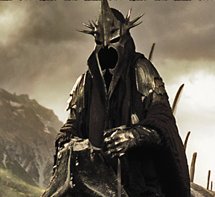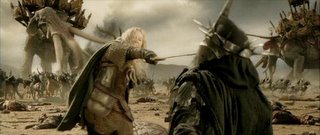ROTK: Bk 5, Ch 6
"Then the Sun went at last behind Mindolluin and filled all the sky with a great burning, so that the hills and the mountains were dyed as with blood; fire glowed in the River, and the grass of the Pelennor lay red in the nightfall"When he heard the horns of Rohan, the Lord of the Nazgul realized that the darkness was breaking too soon. Whatever unanticipated change in events were unfolding, he needed to act quickly to ensure that victory did not slip from his grasp. He abandoned the Gate and disappeared. Theoden and the Men of Rohan charged onto the fields, trampling and slashing the army of Orcs which was now being reinforced by a formidable force of Southrons. One of these men shoots a poisoned dart into Theoden's horse, Snowmane, who rears in terror. And after throwing the King, the horse falls backwards onto him.
Now the Witch-King has returned astride a fell beast:
"The great shadow descended like a falling cloud. And behold! it was a winged creature; if bird, then greater than all other birds, and it was naked, and neither quill nor feather did it bear, and its vast pinions were as webs of hide between horned fingers; and it stank. A creature of an older world maybe it was, whose kind, lingering in forgotten mountains cold beneath the Moon, outstayed their day, and in hideous eyrie bred this last untimely brood, apt to evil."Upon the beast sat the Lord of the Nazgul, wielding a great mace. The beast dug its claws into
 Snowmane and stooped to feast on his flesh. But Dernhelm, the young and faithful rider who bore Merry on his horse, came to Theoden's aid. He commanded the Nazgul to stay away from the King.
Snowmane and stooped to feast on his flesh. But Dernhelm, the young and faithful rider who bore Merry on his horse, came to Theoden's aid. He commanded the Nazgul to stay away from the King."A cold voice answered: 'Come not between the Nazgul and his prey! Or he will not slay thee in thy turn. He will bear thee away to the houses of lamentation, beyond all darkness, where thy flesh shall be devoured, and thy shriveled mind be left naked to the Lidless Eye.'The Witch-King referred to the prophecy of Glorfindel which was spoken after the Battle of Fornost (when the Kingdom of Arnor was broken) in which he said that not by the hand of any living man would the Lord of the Nazgul be destroyed. Dernhelm removed his helmet to reveal the face of Eowyn, her flowing golden hair falling around her shoulders. And with her skilled and deadly blade, she cleaved off the beast's head.
A sword rang as it was drawn. 'Do what you will; but I will hinder it, if I may.'
'Hinder me? Thou fool. No living man may hinder me!'"
It occurs to me that, while the Witch-King is on horseback from the moment he departs Minas Morgul until he enters the Gate of Minas Tirith, we now see him riding his winged steed. Now, how did this all of a sudden come about I wondered. Did he suddenly notice he was missing something at some point along their march? I can imagine him leaning over to his lieutenant: "Damn! Gothmog, be a pal would you and go back to the Dead City to fetch my fell beast? That's a good lad. Oh, and bring a few of your troops with you that are expendable. I forgot to feed her yesterday." It just seems a bit strange that all of a sudden he's able to locate and mount his winged steed in a pinch.
Christopher Tolkien makes an observation in The History of The Lord of the Rings, Vol III: The War of the Ring that gives a clue as to why his father may have written it this way. He discovered an early draft of this last scene that seemed to have existed well before the whole story had progressed this far.
"Whatever his relative dating, the piece certainly gives an impression of having been composed in isolation, a draft for a scene that my father saw vividly before he reached this point in the actual writing of the story." (p. 366-367)
Perhaps Tolkien had written the scenes with the Witch-King on horseback as it made sense from a tactical perspective. He would have wanted to keep pace with his forces and entering the Gates of Minas Tirith on horseback puts him on an equal footing with Gandalf, who is astride Shadowfax. But he clearly preferred the image of the Nazgul on the fell beast "descending" upon Theoden and Snowmane with Eowyn beheading the creature. The fact that the fell beast of the Witch-King doesn't appear until this point is probably one of those little details that he felt the average reader wouldn't really dwell on. Of course, I did. And in the film Return of the King, Peter Jackson remedies this inconsistency by putting the Witch-King astride the fell beast from the moment he emerges from Minas Morgul.
Now the "unhorsed" Lord of the Nazgul attacks Eowyn with his mace. He smashes her shield, breaking her arm in the process. As he raises the mace again to finish her off, Merry creeps behind him. Using his Westernesse blade that he got from his encounter with the Barrow Wight, Merry stabs him in the back of the leg, behind his knee "cleaving the undead flesh, breaking the spell that knit his unseen sinews to his will." With the Nazgul bent over in pain, Eowyn drives her sword into the area where his face would be and he is destroyed, passing away with the wind, never to be seen again.
 So Glorfindel's prophecy that no man may hinder him was true. He was slain not by a man, but by a woman and a hobbit. It is here that Tolkien borrows a concept from Shakespeare's "MacBeth". In that play, the lead character, Lord MacBeth, is given a prophecy that by "none born of woman" could he be killed. Believing himself to be invincible, he battles with his enemy, MacDuff, who does kill him. As it turns out, MacDuff was not "of woman born", but rather was "untimely ripp'd" from his mother's womb by means of a Caesarian section. So, as is the case of the Witch-King, the prophecy is technically correct. However both characters are doomed for being unable to think "outside of the box".
So Glorfindel's prophecy that no man may hinder him was true. He was slain not by a man, but by a woman and a hobbit. It is here that Tolkien borrows a concept from Shakespeare's "MacBeth". In that play, the lead character, Lord MacBeth, is given a prophecy that by "none born of woman" could he be killed. Believing himself to be invincible, he battles with his enemy, MacDuff, who does kill him. As it turns out, MacDuff was not "of woman born", but rather was "untimely ripp'd" from his mother's womb by means of a Caesarian section. So, as is the case of the Witch-King, the prophecy is technically correct. However both characters are doomed for being unable to think "outside of the box".
Afterwards, Merry's blade disintegrates much as the Witch-King's Morgul blade fell away after it stabbed Frodo. And both Merry and Eowyn received grievous wounds in their arms, which fell limb and cold from having made contact with the Nazgul. Before he dies, Theoden bids farewell to Merry. Then he tells Guthlaf the banner-bearer to deliver his standard to Eomer who would now be King of the Mark. Theoden took his nephew as his heir after his son, Theodred, was killed. He also tells Guthlaf to tell Eomer to ride on to victory. Now Eomer and Prince Imrahil are leading their forces against the Harad who were charging the field on their great Mumakil. The battle was intensifying.
Suddenly, all eyes turned south to see the ships with black sails from Umbar arriving along the Harlond - the port and docks of Minas Tirith along the Anduin. The armies of Mordor were  heartened until they noticed the standard of Gondor with the White Tree and Seven Stars unfurled on the lead ship. Aragorn had arrived! With the Host of the Dead, he had seized the ships. The crew were driven mad with fear at the sight of the Dead and fled. Aragorn recruited thousands of men from the southern fiefdoms of Gondor. The reinforcements joined the defenders of the City and the Rohirrim to combat the armies of Mordor.
heartened until they noticed the standard of Gondor with the White Tree and Seven Stars unfurled on the lead ship. Aragorn had arrived! With the Host of the Dead, he had seized the ships. The crew were driven mad with fear at the sight of the Dead and fled. Aragorn recruited thousands of men from the southern fiefdoms of Gondor. The reinforcements joined the defenders of the City and the Rohirrim to combat the armies of Mordor.
Even as the sun set behind Mount Mindolluin, the fighting continued until at last no enemy was left within the circle of the Rammas Echor. The great battle was over.
------
[Chronology: March 15th 3019 T.A.]
------
Next: The Pyre Of Denethor
(revised 10/23/06)

2 Comments:
"Rohan had come at last." Right up there with "Round up the usual suspects." in tugging at my heartstrings.
Jackson's version of charge of the Rohirrim is, to my way of thinking, one of the best -- if not the best -- cavalry charges ever put on film. I found it to be utterly magnificent, from the moment the riders crest the ridge to Theoden's last breath.
Bernard Hill's performance was absolutely perfect, IMO, both stirring and, in the end, sublime. "I go to my fathers, in whose mighty company I shall not now feel ashamed." If you have to go, that's the way to go.
Post a Comment
<< Home